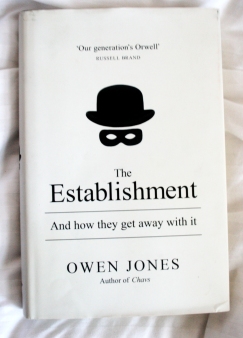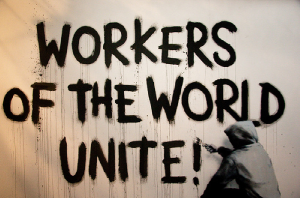In his follow-up to 2012’s Chavs, The Establishment sees Owen Jones perform an incisive dissection of what he terms Britain’s ‘Establishment’. His findings are deeply alarming, as he unveils a nauseating image of a Britain in a state of decomposition on its deathbed, the hungry, gleeful worms of the elite revelling in a State that is on its knees. By the end of this book, Jones is forced to declare that this Establishment “has curtailed and trimmed British democracy, ensuring Britain is a country rigged in favour of a tiny, self-aggrandizing elite. And until that changes, democracy is Britain will be imperilled” (p.193). Yet perhaps the most admirable section of this provocative book is its conclusion; here, Jones takes a break from detailing the gross injustices eating away at the heart of Britain to propose sensible and practical steps for positive social change. Weeks before Russell Brand’s infamously titled publication, the author suggests what we need is a ‘democratic revolution’—a peaceful movement that will offer a more equal spread of wealth across the UK which would improve the lives of the 99%. Jones’ is a welcome voice which vehemently speaks the truth and is far more in tune than the figures of the elite he criticises in The Establishment.
It is safe to say that Jones has a lot of bones to pick in this book, some of which are continued from his previous book. Despite being a passionate voice, he does not just pick up the forceps and dive in wherever his anger will take him; The Establishment is instead a controlled operation split up into eight defined categories or topics of discussion. It starts with a nuanced and informative detailing of the background of British politics in the 20th century. Here, the author outlines how this period saw a dramatic shift from what was for Jones the socialist heyday of the 1970s through to the free market capitalism that took the reins and continues to hold them fiercely today. How did this come about? The key, according to Jones, lies with a change in ideology and the influence of think-tanks. The Mount Pèlerin society which met in Austria in 1947 is claimed as the origin, and their ideology is demonstrated to have quite incredibly snowballed through to the 21st century, wiping out the powers of the trade unions and other such groups which represented the voice of the working classes and once rivalled the ideas of the right.
After this comprehensive run-down of 20th century British politics, Jones moves logically on to the current political scene. Jones works from the premise that a politician should be a democratically elected representative of a community whose needs and wants he/she should voice and fight for. Instead, becoming a politician seems, for the most part, to have become a career path for the elite to enhance their wealth and power. According to the book, 35 per cent of politicians are privately educated, compared with just seven per cent of the general population. Is this, then, an authentic, representative slice of Britain? Jones showcases the incredible extravagance of certain politicians, extravagance that has found its way into the headlines in recent times and is sadly becoming quite the norm in British politics.
Jones then moves to explore the relationship of politics and the media, and how these two supposedly distinct spheres in fact impinge heavily on one another. In this third chapter, Jones describes the heavily and hideously intertwined spheres of the media and politics, and how both serve to prod each other onto ever greater climes of power and wealth. The Murdoch empire inevitably bears the brunt of the criticism. The close association of Rupert Murdoch and his cronies to New Labour is notorious and exposing the hideous crimes of his gang is rather like feeding candy to a baby for Jones. What is more illuminating is the number of politicians who, after having served their time in the political limelight, wind up in highly paid jobs in top corporations which are alarmingly closely linked with the politician’s former governmental role. According to Jones, these links reveal how politicians fail to successfully represent their constituencies in Parliament and instead only seek to address the prodigal desires of free market corporations and the individual politicians themselves.
It is a similar story for the police. Generally perceived by society as a benevolent, impartial force that serves the local community, Jones instead shows the police to be something quite different indeed. I myself had rarely questioned the status of the police before reading this book, and the injustices that Jones outlines in The Establishment I found to be deeply worrying and at times utterly repulsive. From the behaviour of the police at the infamous Hillsborough disaster and during the Miners’ Strike of 1984-5, to stories of crooked cops killing an elderly journalist and then using their power and lies to cover it up, to sickening stories of undercover policemen entering false relationships with supposed enemies of the state—and even going as far to having children with these women—with the sole intention of drawing out apparently necessary information. How did things end up like this? Jones points to the mid-70s and Thatcher’s rise in government. The so-called Iron Lady knew that she needed a force that would cater for and carry out her interests, and so she bought the loyalty of the police with large pay rises. This intelligent tactic was admired and reused by later governments, and this period appears to have seen the death of a fair police force that existed to provide justice and protection for local communities.
The book then reverts back to themes from Jones’ previous publication, Chavs, to consider the highly mediatised idea of those who ‘sponge off the state’. According to right-wing media, there are a large number of people—largely immigrants, of course—who live in the UK without any intention of working and who instead cost the taxpayer millions of pounds each and every year. These people, or so the argument goes, typically have a large clan of children to bring in more money and live in luxurious houses that the typical wage earner can only dream of living in. This is a farcical argument, and Jones demonstrates that if anybody is sponging off the government, it is instead large corporations and banks. The obvious example is the astonishing behaviour of the banks prior to the 2008 crash and the need for taxpayers to fork out billions upon billions of pounds to stabilise an industry of money-thirsty creatures whose incredible behaviour has not changed to this day. There is also the case of those many entrepreneurs and business owners who go out of their way to avoid paying tax, most of whom call upon the ‘expertise’ of the Big Four accountancy firms (Deloitte, PwC, EY and KPMG). I say ‘expertise’ because, as Jones reveals, these firms are actually called upon to write tax laws because of their knowledge of the market, and so they are essentially helping their clients find loopholes in laws that they themselves have written. Jones describes the cases of individuals such as Sir Philip Green, the owner of Topshop and several other top high-street chains, who, on taking a £1.2 billion dividend in 2005, poured his cash into his wife’s Monaco-based account and diligently denied the taxpayer an astonishing £285 million worth of taxes. The bottom line is that while young, intelligent and desperate people are demonised for claiming £50 per week to be able to simply get by, the fact is that HMRC are denied billions of pounds every year that would enable the state to invest and provide the country with better infrastructure and crucially more jobs.
In the final two chapters, Jones firstly tackles the mind-boggling mentalities that rule the roost in the City of London, what he calls “rampant dog-eat-dog individualism”, and the relationship of Britain to both the US and the EU. He is able to enlighten readers once more on the heavy involvement of politicians who frequently act in defence of their friends in the City, allowing them to cuddle huge bonuses during the good times and avoid responsibility during worse times by footing the bill with the taxpayer. The image we receive of the UK in relation to the US is rather like one of an obedient puppy who waddles around behind its ally ready to go and ‘fetch’ whenever told to do so. The EU, instead, seems to be a riddle for the free market ideologues of the UK, an organisation that puts boundaries and limits in place that constrain and frustrate those across the different realms of The Establishment. Is it any wonder, then, that a right-wing, anti-Europe party is washing across the UK and the Conservatives are offering a referendum on Europe in their next campaign?
If all of the above sounds like socialist propaganda spouted from the mouth of an over-zealous labourite, I would still urge you to read this book. If anything, it offers another perspective of modern Britain that challenges the ideas and policies that today govern British life. We must always remain sceptical and challenge those at the top, and this book certainly does that. What is beyond doubt is that there is a whole generation of people disillusioned with politics and the options available to them. This is a book that, if anything, underlines the necessity for change, evolution and development in British society and it should be taken seriously.
The Establishment is published by Allen Lane (Penguin) and is available for £15.99.
Owen Jones (@OwenJones84) is also worth a follow on Twitter.







